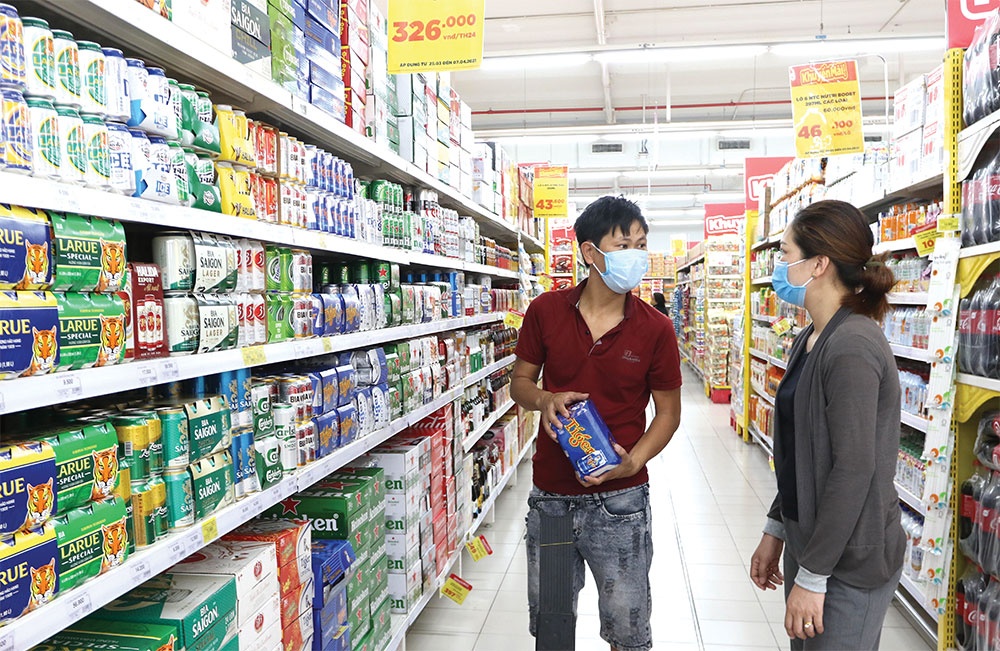Players take sides in drink tax discussion
 |
| The government is looking to long-term health of its citizens, but beverage firms say they need more time, photo Le Toan |
Alcohol, tobacco, and sugary drinks could be subject to an increased excise tax aiming to improve community health and tackle the national budget deficit as part of a comprehensive tax reform strategy for 2030. However, the size of the proposed increase has not yet been decided, and the Ministry of Finance (MoF) is consulting ministries, localities, and firms on the matter.
The MoF’s proposal aims to improve community health and tackle the national budget deficit as part of a comprehensive tax reform strategy for 2030.
According to the Vietnam Beer-Alcohol-Beverage Association (VBA), it is too early to fully assess the impact of tax rises or the addition of sugary drinks to the list of special taxable goods because the changes are only tentative. However, growing taxes will raise the financial burden on businesses, which need to have time to prepare and plan their production.
In Vietnam, alcoholic beverages are currently subject to an excise tax rate of 65 per cent, up from 50 per cent in 2018.
“Enterprises are very concerned and worried about this proposal being implemented early because businesses are still in the post-pandemic recovery stage,” said VBA chairman Nguyen Van Viet. “The adjustment to increase excise tax will put pressure on businesses and tax rises will directly affect people’s lives.”
The VBA has called on government bodies to consider a more appropriate roadmap to amend the excise tax law after 2025. The association explained Vietnam’s difficulties, from external and internal influences, and said it was too early to judge whether growth will be more sustainable and developed in 2023 and beyond.
“Therefore, we believe the MoF and the government will need more time to evaluate the conditions to decide which time is most suitable,” added Viet.
Katsuhiko Usui, general director of Sapporo Vietnam, said, “Currently, the details of a draft law have not been disclosed, so we cannot comment in detail, but if the tax is raised, it will definitely have a negative impact on the industry.”
He explained that the industry had faced a difficult situation in the past few years, though it was expected that it would gradually recover in the near future.
“There are many unstable factors, such as soaring prices of raw materials worldwide, and it is expected that it will take a little more time to reach pre-pandemic levels. For this reason, we think it is necessary to consider delaying the timing of the tax increase and easing the extent of the increase,” said Usui.
The purpose of the tax increase should also be clarified, he added. “If the goal is to increase tax revenue, there is a possibility that this purpose will not be achieved due to a decline in the aggregate demand.”
SSI Securities said that input costs are expanding, and the beverage industry mainly imported materials that are affected by global economic issues, such as the Russia-Ukraine conflict. With supply chains broken, there is no sign of prices cooling. According to the MoF, the consumption of alcohol in Vietnam is high and rising, and the excise tax increases between 2016-2018 were not strong enough to affect consumption.
Meanwhile, the ministry also pointed to a World Health Organization report that showed that high consumption of soft drinks leads to obesity. The prevalence of overweight Vietnamese adults increased by 68 per cent between 2002 and 2016, it said.
The MoH added that there was recent evidence linking sugary beverage consumption with non-communicable diseases, increased health costs, and higher mortality.
 | Tax for development: Does Vietnam need tax reform? To remain on its successful path of inclusive development, Vietnam will need large public investments for years to come. |
 | Vietnam Tax Summit 2022 covers up-to-date tax legislation Vietnam Tax Summit 2022, the largest annual tax summit in the country that took place last week, featured thought-provoking guest speakers, industry experts, and tax specialists. |
 | Careful consideration required for sugary drink tax In addition to increasing the excise tax on beer, wine, and tobacco, the Ministry of Finance has once again proposed to put sugary drinks into taxable status. Adam Sitkoff, executive director of the American Chamber of Commerce in Hanoi, spoke to VIR’s Nguyen Thu about the latest proposal. |
What the stars mean:
★ Poor ★ ★ Promising ★★★ Good ★★★★ Very good ★★★★★ Exceptional
Related Contents
Latest News
More News
- State corporations poised to drive 2026 growth (February 03, 2026 | 13:58)
- Why high-tech talent will define Vietnam’s growth (February 02, 2026 | 10:47)
- FMCG resilience amid varying storms (February 02, 2026 | 10:00)
- Customs reforms strengthen business confidence, support trade growth (February 01, 2026 | 08:20)
- Vietnam and US to launch sixth trade negotiation round (January 30, 2026 | 15:19)
- Digital publishing emerges as key growth driver in Vietnam (January 30, 2026 | 10:59)
- EVN signs key contract for Tri An hydropower expansion (January 30, 2026 | 10:57)
- Vietnam to lead trade growth in ASEAN (January 29, 2026 | 15:08)
- Carlsberg Vietnam delivers Lunar New Year support in central region (January 28, 2026 | 17:19)
- TikTok penalised $35,000 in Vietnam for consumer protection violations (January 28, 2026 | 17:15)

 Tag:
Tag:




















 Mobile Version
Mobile Version